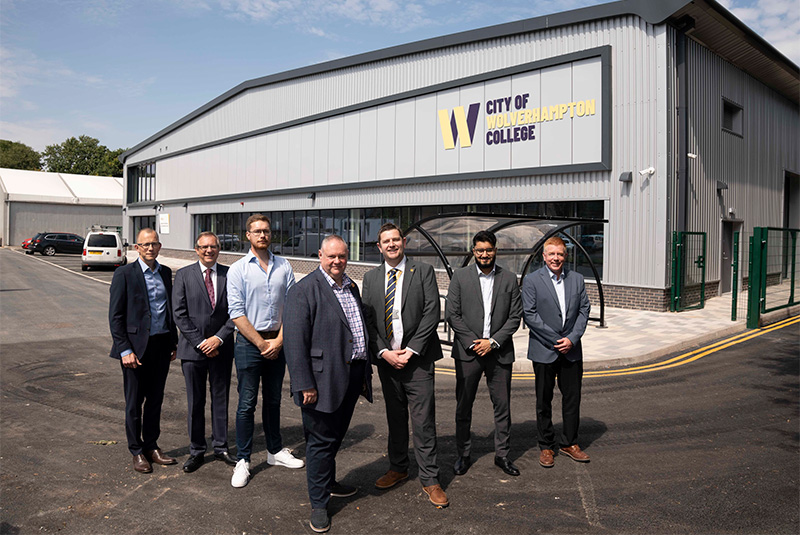Construction completed on new £8.1m training facility as first part of City Learning Quarter masterplan
Released: 31 July 2024

City partners are celebrating the completion of construction on the first phase of the council’s City Learning Quarter masterplan.
The new £8.1 million City of Wolverhampton College Advanced Technology and Automotive Centre on its Wellington Road campus in Bilston has been handed over by contractor Speller Metcalfe on schedule following an 11-month build.
The college will now move its kit into the state-of-the-art training facility ready to open its doors to students in September when the new academic year starts.
It will secure hundreds of jobs in the local economy and create learning opportunities for thousands of students – specialising in engineering and automotive, including electric vehicles (EV).
Its construction has been funded by £7.7 million from the West Midlands Combined Authority (WMCA), with the remainder from the Black Country LEP.
The centre has been designed for engineering and automotive studies - with facilities for new electric, hybrid and traditional vehicles, as well fabrication, manufacturing, welding, CAD and robotics.
It will deliver a multi skilled flexible workforce addressing skills shortages in the city. Almost 5,500 learners and 954 apprenticeships are forecast over the first ten years of the centre.
Phase two of the City Learning Quarter masterplan is in progress with McLaughlin & Harvey constructing a city centre campus that will pave the way for the college to move from its out-dated Paget Road site, while Speller Metcalfe is delivering transformational works on the neighbouring Adult Education Wolverhampton and Central Library facilities.
The courses the purpose-built Bilston centre will host are not suitable for the city centre location.
City of Wolverhampton Council Cabinet Member for City Development, Jobs and Skills, Councillor Chris Burden, said: “The City Learning Quarter is a key priority for the city that will transform the learning environment for our students and residents through a top-class education and skills offer.
“I’d like to thank Speller Metcalfe for delivering such a fantastic new training facility at the college’s Wellington Road campus in Bilston.
“Advanced technology and automotive is a rapidly growing economic sector, creating learning and jobs opportunities for people of all ages in our city and beyond.
“It aligns with Wolverhampton’s strong credentials as a front runner in green industries, which will be further supported by the development of our Green Innovation Corridor as one of the three pillars in the West Midlands Investment Zone.”
Malcolm Cowgill, principal and chief executive at City of Wolverhampton College, said: "After years of discussions it is fantastic to see the Advanced Technology and Automotive Centre complete.
"This means that, from September, students enrolling for automotive and engineering qualifications will benefit from first-class, industry-standard training facilities which will prepare them for their future careers in the industry, and employers will benefit from a workforce equipped with the knowledge and skills that their businesses and the wider sectors need.
"The completion of this first phase of our campus transformation project, combined with the new campus in the City Learning Quarter due to open for the 2025/26 academic year, will transform the learning environment for thousands of students and apprentices for many years to come."
Richard Parker, Mayor of the West Midlands and chair of the WMCA Board, said: “The West Midlands has a proud heritage in manufacturing, especially in the automotive industry. But these industries, and the jobs that come with them, won’t be available to our residents if we don’t innovate for the future.
“We are backing the future of this region by investing in the state-of-the-art Advanced Technology and Automotive Centre. It will be instrumental in keeping the West Midlands’ vital manufacturing sector at the forefront of the industry. And will ensure our residents have the skills needed to access new jobs so our region can thrive.”
Divisional Director for Speller Metcalfe, Rob Lashford, said: “We’re extremely pleased to have delivered the new Advanced Technology and Automotive Centre. We know how important this new facility will be both to students and the economy of Wolverhampton. The scheme has also been a fantastic example of social value, with the scheme returning over £3.5 million in social value activities.”
The phase two City Learning Quarter college campus is being built around the Old Hall Street and St. George’s Parade area of the city centre, incorporating a site on the corner of Garrick Street and Bilston Street, where the former Faces nightclub building once stood, the development is also utilising City of Wolverhampton College’s existing Metro One building.
It is due to open in September 2025 and will benefit skills and employment outcomes for residents across the city and wider region.
The exciting main City Learning Quarter development proposals were initially supported by investment from the council and Black Country LEP, and the council has also secured £49million from UK Government for the scheme.